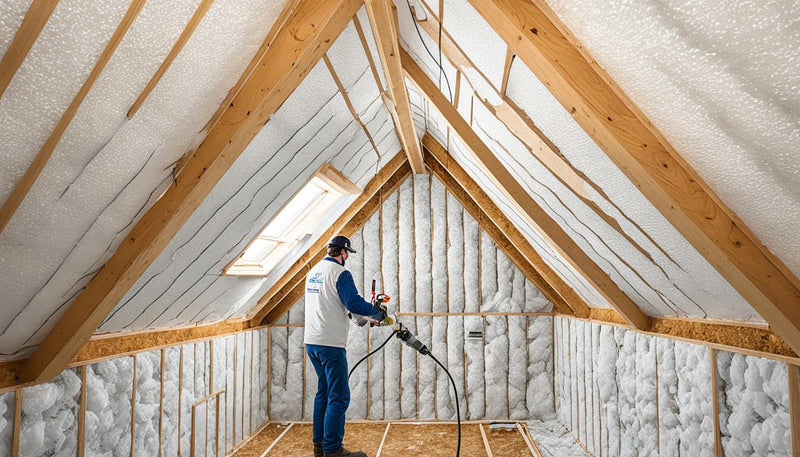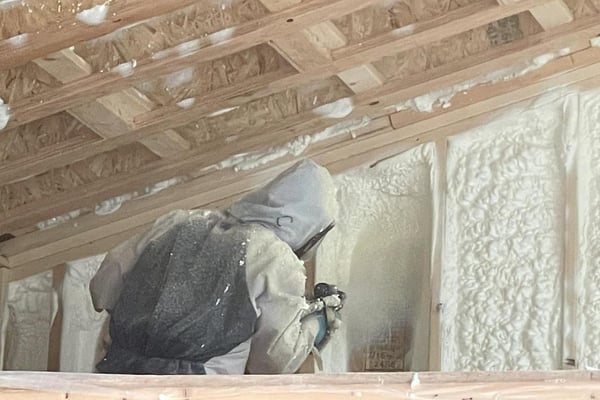Contrasting Spray Foam to Standard Insulation: Which Is Better?
Spray Foam: The Ultimate Remedy for Air Sealing and Insulation
Spray foam insulation has arised as a leading option for efficient air sealing and thermal insulation, supplying an unique combination of buildings that set it apart from standard methods. Comprehending the complete scope of its benefits, installment procedures, and comparisons with other insulation types is critical for making notified decisions.
What Is Spray Foam?
Spray foam is a flexible insulation material that incorporates the concepts of air securing and thermal resistance to boost energy efficiency in buildings. Composed mainly of polyurethane or various other comparable substances, spray foam is applied as a fluid that expands upon contact with surface areas, creating a strong, continual layer of insulation. This distinct residential property enables it to load spaces, cracks, and gaps that typical insulation products might overlook, offering an exceptional air seal.
There are 2 major sorts of spray foam: open-cell and closed-cell. Open-cell spray foam is lighter and much more adaptable, providing outstanding sound absorption and a lower R-value per inch - Spray Foam. On the other hand, closed-cell spray foam is denser, giving a greater R-value, moisture resistance, and added architectural integrity to developing components
The application process generally entails customized devices, ensuring a smooth application that follows different substrates, consisting of wood, concrete, and steel. This flexibility makes spray foam suitable for both new constructions and retrofitting existing frameworks. Its capacity to develop an impermeable barrier significantly contributes to lowering energy usage and enhancing indoor air top quality, thereby making it a preferred choice among building contractors and house owners alike.
Benefits of Spray Foam Insulation
Among the most considerable benefits of spray foam insulation is its phenomenal capacity to develop a continual air barrier, which properly minimizes energy loss. Unlike conventional insulation products, spray foam increases to load voids and fractures, ensuring that air leak is dramatically decreased. This characteristic not only improves energy efficiency but likewise causes reduce energy expenses with time.
In addition, spray foam insulation gives superior thermal resistance, contributing to a more secure indoor atmosphere. Its high R-value per inch enables efficient insulation in restricted spaces, making it ideal for attic rooms, wall surfaces, and crawl rooms. Moreover, the moisture-resistant properties of spray foam assistance avoid mold and mold development, advertising much healthier living conditions.
One more essential benefit of spray foam insulation is its sound-dampening high qualities (Spray Foam). It effectively minimizes noise transmission between rooms, developing a quieter and a lot more comfy home setting. The resilience of spray foam also attracts attention, as it does not droop or work out gradually, keeping its efficiency throughout its life expectancy
How Spray Foam Works
Comprehending exactly how spray foam insulation functions is necessary for valuing its performance in air sealing and thermal resistance. Spray foam insulation includes two primary components: isocyanate and polyol material. When these elements are blended, they undergo a review chain reaction that triggers the material to broaden quickly, developing a thick foam that fills cracks, spaces, and cavities.
As the foam expands, it follows surface areas, creating an impermeable seal that significantly decreases air infiltration. This particular makes spray foam insulation extremely reliable at stopping drafts and wetness infiltration, which can result in energy loss and damage with time. Furthermore, the closed-cell version of spray foam supplies exceptional thermal resistance because of its stiff framework, efficiently reducing warmth transfer.
The special homes of spray foam permit it to conform to uneven surface areas, making certain detailed insurance coverage and a smooth obstacle. Therefore, spray foam insulation not just boosts power effectiveness yet likewise contributes to boosted interior air top quality by minimizing the accumulation of irritants and toxins. Ultimately, recognizing the technicians behind spray foam underscores its function as a premium option for read here insulation and air sealing in both business and property applications.
Installation Process Summary

Before installment, the space should be appropriately cleaned and prepped, making sure that surfaces are devoid of dust, particles, and wetness. Due to the fact that contaminants can endanger attachment and total efficiency, this step is important. As soon as the area is prepared, the application includes mixing both parts of the spray foam, which expands upon get in touch with and loads voids properly.
Trained specialists must perform the installment, utilizing specialized tools to ensure uniform insurance coverage and ideal thickness. Security preventative measures, consisting of wearing safety equipment and making certain proper ventilation, are imperative during this procedure. After application, the foam normally remedies quickly, forming a strong obstacle that boosts power efficiency.
Contrasting Spray Foam to Standard Insulation
When reviewing insulation choices, spray foam insulation stands out in contrast to standard materials such as fiberglass and cellulose. Unlike these details fiberglass and cellulose, which can permit air infiltration, spray foam expands upon application, filling spaces and holes to create a closed seal.
In addition, spray foam gives a higher R-value per inch than typical insulation types, providing even more effective thermal resistance in a thinner profile. This particular is specifically beneficial in rooms with minimal dental caries depth. Spray foam is resistant to moisture and mold development, which can be a substantial worry with cellulose and fiberglass, especially in humid environments.
However, spray foam insulation usually brings a higher in advance cost than its typical counterparts. Property owners must evaluate this first financial investment against long-lasting energy cost savings and performance benefits. Inevitably, while both insulation types offer their objective, spray foam becomes a much more innovative option for modern-day insulation demands, especially in regards to air sealing and thermal effectiveness.

Final Thought
In summary, spray foam insulation stands for a highly efficient solution for attaining optimal air sealing and thermal resistance. Its special homes, consisting of wetness resistance and audio dampening, make it appropriate for numerous applications in both brand-new constructions and retrofitting tasks (Spray Foam). Although the preliminary expenses may be higher contrasted to typical insulation materials, the long-term advantages, such as considerable energy financial savings and enhanced interior air top quality, validate the investment and underscore its value in modern-day structure practices.
Spray foam insulation has emerged as a leading service for efficient air sealing and thermal insulation, supplying an one-of-a-kind combination of residential or commercial properties that establish it apart from standard methods.Spray foam is a functional insulation product that combines the concepts of air sealing and thermal resistance to boost energy efficiency in buildings.When reviewing insulation options, spray foam insulation stands out in comparison to conventional materials such as fiberglass and cellulose. Ultimately, while both insulation kinds serve their function, spray foam arises as an extra innovative remedy for contemporary insulation demands, especially in terms of air sealing and thermal efficiency.
In recap, spray foam insulation represents an extremely efficient option for accomplishing ideal air sealing and thermal resistance.